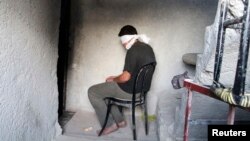The international organization Human Rights Watch says world governments make a serious mistake when they sacrifice human rights in the name of tightening security measures.
In its annual review of global human rights released Thursday, the group said Nigeria, Iraq, Syria, Israel and the United States are among the nations using security concerns to justify the violation of human rights.
According to Executive Director Kenneth Roth, tightening security can be "counterproductive" by eroding trust and aggravating tensions among groups.
"Some governments make the mistake of seeing human rights as a luxury for less trying times, instead of an essential compass for political action," he said. "Rather than treating human rights as a chafing restraint, policymakers worldwide would do better to recognize them as moral guides offering a path out of crisis and chaos."
Blame Syria, Iraq
The report blamed Iraq and Syria for "sectarian and abusive" policies that fueled the rise of Islamic State extremism. It said Syrian use of violence on civilians and the Iraqi government's isolation of Sunni Muslim communities gave the Islamic State an opportunity to recruit support from those groups.
Human Rights Watch also said Nigeria and Israel have allowed their military personnel to be abusive as they struggle to contain the militant groups Boko Haram and Hamas.
And the group said President Barack Obama has refused to investigate or prosecute those responsible for alleged torture by the CIA, which was detailed in a recent U.S. Senate probe.
"That abdication of his legal duty makes it more likely," said the documents, "that future presidents will treat torture as a policy option instead of a crime."
The report said meeting security challenges demands not only containing dangerous elements, but also, "rebuilding a moral fabric that underpins the social and political order."
Russia takes a 'leap backwards'
U.S.-based international human rights groups say the rights situation in Russia deteriorated markedly last year.
In its annual report, Human Rights Watch (HRW) says the Russian government "took a leap backwards" in 2014, "demonstrating little respect for its human rights obligations" and expanding "its crackdown on independent voices through even more restrictions on free expression."
Russia's government pushed through new "draconian laws" on nongovernmental organizations, the media, and the Internet, and launched "public smear campaigns against its perceived critics," as it "sought to control the narrative about developments in Ukraine, the group wrote.
In one of many moves to curtail media coverage and impede independent voices to reach large audiences, President Vladimir Putin called independent groups and government critics “national traitors” and “a fifth column” seeking to destabilize the country, HRW said.
While crediting Western governments for pressuring Russia to withdraw from Crimea and stop supporting separatist rebels in eastern Ukraine, including through the use of targeted sanctions, HRW criticized them for what it said was an inadequate understanding of and response to Russia's growing authoritarian rule since President Vladimir Putin returned to the Kremlin in 2012.
Freedom House said in its annual report released Wednesday that what it called "Russia's invasion of Ukraine, including the outright seizure and formal annexation of Crimea," was a "prime example" of a tendency last year for autocratic governments around the world to show "open disdain for democratic standards."
President Vladimir Putin made his contempt for the values of liberal democracy unmistakably clear, Freedom House said, by equating "raw propaganda with legitimate journalism," treating "human rights activists as enemies of the state," and denouncing "the LGBT (lesbian, gay, bisexual, and transgender) community as moral degenerates."

